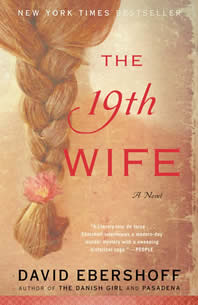Today's guest blogger, David talks about how he drew on historical figures like Ana Eliza for the novel --- and reveals the character he "unashamedly lifted from life," who happens to be a close companion of his.
 Often when I'm speaking to a book club, whether on the phone or in person, someone asks how much in The 19th Wife is true. When a novel is inspired by real people and real events, it's human nature to wonder what is history what is a product of the author's imagination.
Often when I'm speaking to a book club, whether on the phone or in person, someone asks how much in The 19th Wife is true. When a novel is inspired by real people and real events, it's human nature to wonder what is history what is a product of the author's imagination.My short answer is that the basic arc of Ann Eliza's story is based on real events; and that Jordan's story is inspired by people I met who lived in circumstances similar to his. But when I get to speak to a book group, I can elaborate on this, including the details I uncovered in my research, such as why Ann Eliza's father married his third, fourth and fifth wives over the course of four weeks; or how the First Lady of the United States, Julia Grant, received Ann Eliza when she went to Washington, D.C., to plead her case against polygamy. In general, I try to explain how I wove historical facts into the novel's fabric; how and why I relied on certain sources; and, finally, why the historical record, vast that it is, can often prove inadequate.
After all, I assume a book group is interested in speaking to an author to get the inside scoop. And so the one tidbit I always share with book groups, the one perhaps I'm fondest of, is the character in the novel who is wholly, entirely real. I mean literally, unashamedly lifted from life. No, I'm not talking about Ann Eliza Young or Brigham Young or even Jordan Scott, the narrator of the murder mystery. I'm talking about Elektra, Jordan’s dog.
Jordan's description of Elektra is accurate: "She's got rich brown hair that turns red in the sun, yellow-gold nearly electric eyes --- you'd swear there were bulbs behind them --- and the kind of long long legs that make people turn around and whistle." Elektra --- the real Elektra, I mean --- behaves just as the dog in the book: she's loving, loyal, perceptive, tender, but also needy, loud, peevish, barfy and, every once in awhile, a complete pain in the butt.
Like most dogs, Elektra is convinced that each day should be bent around her schedule. Yet one of the most remarkable things about my dog is that when I sit down to my desk to write, she immediately curls up at my feet and goes to sleep. Somehow she senses that this is the important work of the day and that I need a span of peace. It's as if a Do Not Disturb sign is hanging around my neck and she can read it. Perhaps I emit a particularly intense, maybe even scary vibe whenever I'm writing and she intuits not to mess with that. Maybe she has figured out that my hours at the keyboard lead to income and income leads to kibble and squeaky toys.
Whatever it is, for nine years now, ever since she was an adorable but puddle-prone puppy she has always allowed me my quiet hours each day for writing. That's how Elektra became a part of The 19th Wife: just as Jordan's dog goes everywhere with him, my dog was with me through all the drafts and rewrites, always snoring lightly at my feet. For the four years I was writing the novel, Elektra slept loyally under my desk. She is there now as I write this sentence. She'll be there tomorrow, and I can only hope for a long time to come.
Whenever I speak by phone to a reading group, I often wonder who is on the other end of the line. I hear the voices but I wonder what everyone looks like and about the room the group is meeting in and who is sitting where and what kind of food and drinks are being served. In case you've ever wondered that about the author you are chatting with, I can tell you now, in case we speak one day, almost certainly I am on the couch --- the big red one in the den --- with Elektra curled warmly at my side. I don't know who enjoys speaking to a reading group more, her or me. For me it's a chance to hear many intelligent and often unexpected comments about my work from thoughtful, friendly strangers. For Elektra, it's a nice quiet hour with her head in my lap. I hope you have a chance to meet her one day over the line.
---David Ebershoff






